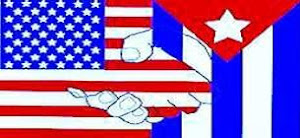BBC News (London)
Fernando Ravsberg
Havana
The decision of the U.S. diplomatic could be considered the beginning of the thaw after a decade of harsh confrontation.
For the first time in 10 years, Cuban dissidents was not invited to the diplomatic reception of the U.S. Interests Section Cuba (SINA).
Instead U.S. officials invited dozens of artists, intellectuals and academics.
Most of the attendees were people living in Cuba and are of somehow linked to the government. None of them came to one of these receptions from a decade ago, when relations with the government of George W. Bush tightened.
USIS officials do not seem to want to hide the policy change.
Quite the contrary, they invited all representatives of the press foreign, knowing that tomorrow would be news in the fact worldwide.
The first steps An official of the Interests Section of the U.S., told BBC World that "the dissidents were not invited" this time and that first time since President Bill Clinton, "were issued only invitations to artists, intellectuals and academics. "
The highest-ranking U.S. officials including the head of the Section, were all Cubans at the door of the residence, shook hands with each of the guests and exchanged words kind to them.
Members of the U.S. embassy told BBC News they expect the recurrence of such activities. Asked about the possibility of attending Cuban government officials responded that "you can not run before learning to walk. "
The cream
Altogether, some 200 artists, intellectuals and academics Cubans.
Among the most prominent painters were Fabelo, Choco and Medivez, the ceramist José Fuster and musicians Chucho Valdes and Juan Formel, director the popular group Los Van Van. Formel told BBC News he had attended because "I was invited and because there a better atmosphere between the two countries "but refused to deepen the change of status, something that happened to most conversations.
Jose Fuster, however, said: "I received the invitation and no message contrary and therefore came. "He added that" never forbade me to attend but I warned the opposition that would come and I chose to stay in house, I do not like being used for advertising."
Signs of thaw
Undoubtedly several signals is mutual. The U.S. government take away public dissent and yet recognized as "society civil intellectuals, artists and Cuban academics who maintains good relations with the government.
The answer is implicit in Havana in the presence of about 200 people, the cream of the national intelligentsia. A fact that could be considered the beginning of the thaw, after a decade of harsh clashes.
"The increased cultural contacts between the two countries," explains a officer of SINA. However, a policy not to make statements press officers and still remains to ensure that it meets are barred cameras and tape recorders.










0 Comments:
Post a Comment